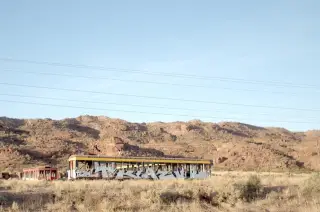LOCARNO, Switzerland — In the sun-drenched hills of Locarno, where dreams flicker like film reels against the alpine sky, a new cinematic vision is taking shape. At its heart stands Sophia Mocorrea, the acclaimed writer-director behind the Sundance-winning short “Kidnapping of the Bride” and her eagerly anticipated feature “Marriage by Abduction,” which recently claimed the Les Arcs Talent Village Award in December. Now, she moves forward with what may become her second feature — a hauntingly resonant project titled Vaca Muerta.
Penned by Mocorrea herself, Vaca Muerta emerges not only as a deeply personal story but also as a flagship endeavor for Matadoras, a bold new production house based in Berlin. Founded this year by Mocorrea alongside Sarah Valerie Radu, Nina Bayer-Seel, and Markus Krojer, Matadoras is dedicated to championing auteur-driven fiction and documentary storytelling — works that echo with truth, complexity, and emotional depth.
This week, as part of the Match Me! networking forum at Locarno Pro (running August 8–10), Radu steps into the spotlight, carrying with her the promise of stories yet to be told.
Vaca Muerta — a name that translates to “Dead Cow” — unfolds as a richly layered social drama, seen through the fractured lens of northern Patagonia, Argentina. The film weaves together four distinct lives, each shadowed by the sprawling presence of the fracking industry. A firefighter haunted by the aftermath of a deadly landslide; a paleontologist grappling with a discovery that slipped through his fingers; a young girl piecing together her identity from ancient myths; and a lawyer caught between the ideals of justice and the seduction of ambition. Each character walks a path marked by loss, longing, and quiet rebellion.
“Vaca Muerta is an episodic film that subtly interweaves personal stories with overarching tensions,” reads the synopsis, “moving between reality and projection, exploitation and self-deception — all set against the backdrop of a region adrift in a political vacuum.”
As Raku explains, “In Vaca Muerta, four narrative strands unfold in Argentina’s fracking region, where fine fractures run not only through the earth, but also through society — revealed in differences of class, origin, and generation.” Her voice carries both urgency and reverence when she speaks of Mocorrea’s work: “She brings a deeply personal and poetic lens to this film. It quietly meditates on exploitation, identity, and resistance, revealing intimate stories that resonate far beyond their local setting.”
From the earliest stages of development, the project has embraced sustainability — both in content and in production — seeking to raise awareness about ecological and social inequalities. It is a film born not just of artistic vision, but of ethical responsibility.
Meanwhile, Mocorrea’s previous feature, Marriage by Abduction, developed at the Torino Script Lab, approaches its final financing stage. Raku reflects: “It continues her focus on narratives that approach human experiences and social realities with subtlety and universal relevance.” Each frame, each line of dialogue, seems to whisper truths too often left unspoken.
Speaking of Matadoras’ broader mission, Raku adds: “With a focus on stories that resonate internationally, we aim to build creative and financial partnerships early on within a global context. An early dialogue with platforms, broadcasters, and distributors is essential — particularly when it comes to positioning and ensuring visibility for our films. But equally important is our flexibility, our ability to adapt our strategy to the unique needs and character of each individual project.”
At Match Me! in Locarno, Radu will also introduce another daring project from Matadoras’ slate — War And Plastic Surgery, directed by Yara Khalil. Set amidst the chaos of war and crisis in the Middle East, the film poses a provocative question: “How did beauty — however defined — become a tool for resistance and survival?”




